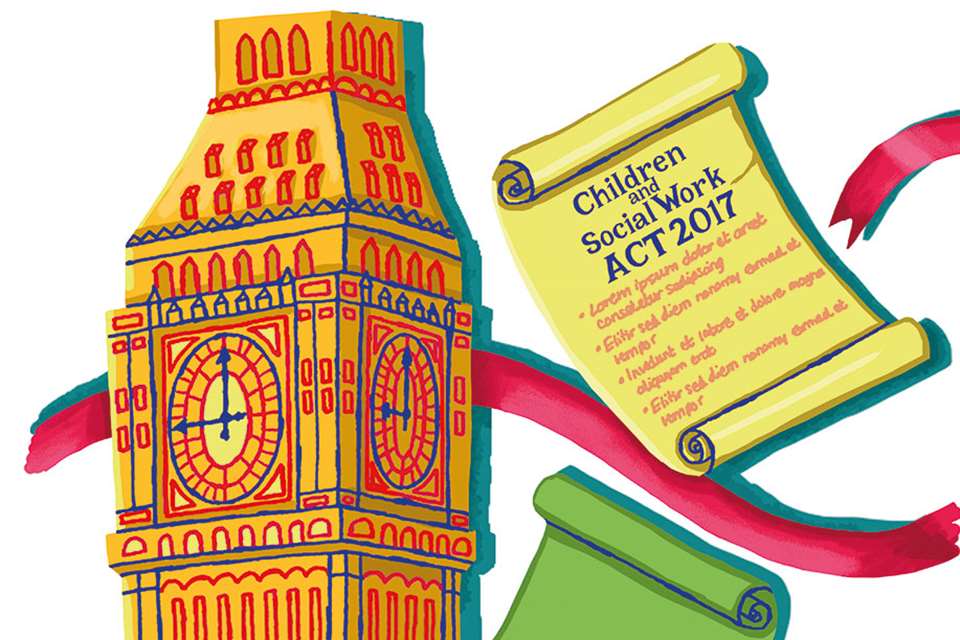Children and Social Work Act, Part 2: Sex/Relationships Education - Good relations
Ann Marie Christian
Monday, October 16, 2017
What did the new act, which takes effect in 2019, say about relationships education for 4 and 5 year olds? Safeguarding consultant Ann Marie Christian explains

One of the most headline-grabbing aspects of the Children And Social Work Act, which gained Royal Assent in April 2017 but doesn’t come into effect until 2019, relates to what is traditionally known as sex education. Primary-school-aged children in schools must receive relationships education. At secondary schools, ‘sex and relationships’ education is designed to reflect a need to protect children from issues such as cyberbullying and sexting. This applies to all schools, including academies.
According to the policy statement, relationships education will cover different types of relationships, including friendships and family relationships, dealing with strangers, how to recognise, understand and build healthy relationships, including self-respect and respect for others, commitment, tolerance, boundaries and consent. It will also cover how to manage conflict, as well as how to recognise unhealthy relationships, and how relationships may affect health and well-being, including mental health, and safety online.
All primary schools (maintained, academies or independent) will be required to provide relationships education (and will retain their current choice to teach age-appropriate sex education) – there is no right for parents to withdraw the child, contrary to sex education at secondary-school level.
The act also states that schools should ensure ‘education is appropriate having regard to the age and the religious background of the pupils’.
The Government has also committed to making personal, social, health and economic education compulsory via regulations covering academies and maintained schools.
The move for sex and relationships education in schools follows months of pressure from MPs and campaigners concerned about the rise in sexualised behaviour of children, access to online pornography, and the growing prevalence of sexting.
Background
Online safety is a massive challenge in 2017. Children as young as three are given electronic devices. They are born in an era where this is acceptable because their favourite character has an app they watch or play almost daily and parents are often tempted to give themselves some quiet time by distracting the child with one. While most households have parental guidance controls, some don’t, and children can be exposed to harmful materials. The new legislation states children have to be taught about keeping themselves safe online by both parents and education settings.
Moves to introduce relationships education date back to 2000 with the DfE statutory guidance ‘Sex and Relationship Education’, introduced to schools and colleges. But over the past 17 years, schools have struggled to implement this and keep up with the constantly evolving virtual world. Delivery across the country has also been patchy. Charities have stepped in to provide resources: the NSPCC started The Pants (Underwear Rules) a few years ago. This campaign targeted children from the EYFS up to 16 years, with lesson plans, footage and resources to help educators explain to children where others should not try to touch them, how to react and where to seek help.
The new law means that, for the first time, children will be taught about what healthy relationships are. In theory, this will enable them to ask relevant questions or disclose a problem to a trusted adult.
The act highlights the importance of teaching children as young as four about empathy, kindness, positive friendships and harmless play. These skills play an important part in equipping children to self-protect and not be a target for others. The idea of the education is that children will also be enabled to have an insight into their emotions and feelings, and discuss kindness and cruel behaviours. They will be taught how to recognise these behaviours and keep themselves safe.
This is encouraging and has been widely welcomed. We shouldn’t forget, however, that this comes about because of increasingly problematic attitudes to sex among children, even among the very young. An investigation by the Press Association earlier this year revealed that children as young as five had been excluded from school for sexual misconduct. And last week it emerged there has been a 71 per cent rise in child-on-child sex assaults over the past four years.
Challenges
Adults involved in teaching the healthy relationships education will need specialist training, and schools will have to decide whether to equip teachers to do this or employ other agencies. Children are more likely to make disclosures when the subject is taught if they recognise problematic behaviour, so settings will have to consider how they deal with this. Children with additional needs and English as a second language may need further assistance in understanding what is being taught.
Consultation
The new regulations will be consulted on by the Department for Education. They will be subject to a debate and parliamentary vote. A consultation is expected some time this autumn – a DfE spokesman said it would take place ‘shortly’. New statutory guidance will be published in early 2018 – at least one year before the law takes formal effect, in September 2019
Further information
Childnet and NSPCC provide very good age appropriate resources, for example e- books, footage and posters





